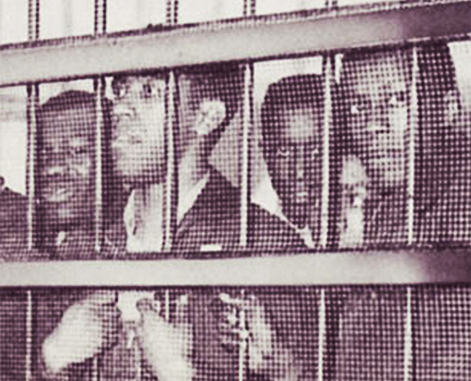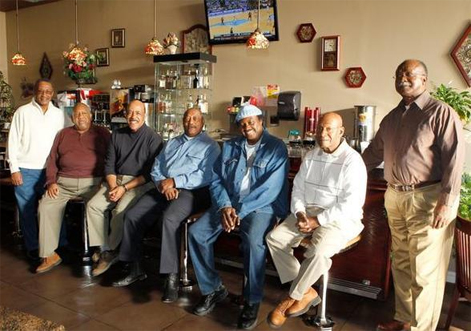| |
Righting
History:
‘Friendship
9’ will
have
records
cleared
more
than 50
years
later
By
Jackie
Bridges
/
Special
to Tell
Us USA
ROCK
HILL, SC
- For
more
than
five
decades,
the
group of
black
men
known as
the
“Friendship
Nine”
have had
criminal
records.
They
were
arrested
and
charged
with
trespassing
Jan. 31,
1961,
for
sitting
at a
white
lunch
counter
in Rock
Hill,
S.C.
On Jan.
28,
their
lawyer
will
file a
motion
in South
Carolina’s
16th
Circuit
Court to
vacate
their
trespassing
conviction.
Shelby
native
and
author
Kim
Johnson
was the
driving
force
behind
getting
their
records
cleared.
“We’ve
got to
honor
what Dr.
Martin
Luther
King Jr.
gave his
life
for, and
that was
non-violence,”
Johnson
said.
“Fifty-four
years
ago,
they
were
arrested,
and we
should
have
taken
care of
it
before
now.
This is
a
remarkable
piece of
history
that we
cannot
forget.”
Staying
in jail
Johnson
wrote
their
story in
a
children’s
book
last
year and
reminded
the
community
of the
valuable
part the
men
played
in the
Civil
Rights
Movement.
The book
explains
that it
was the
first
time any
of those
arrested
for
civil
disobedience
refused
to pay
the fine
and took
the
prison
sentence.
The
concept
was
called
“Jail,
No
Bail,”
and it
had been
proposed
but
everybody
was
scared
to do
it,
Johnson
said.
One of
the men,
Clarence
Graham,
said
when his
group
was
approached
by
Thomas
Gaither,
a field
secretary
for the
Congress
of
Racial
Equality,
they
decided
to
accept
the
no-bail
challenge.

“We were
going to
stay in
jail,”
Graham
previously
told The
Star.
“It was
very
dangerous.
We
didn’t
know
what
would
happen,
but
something
had to
be done,
and we
had to
do it.”
The
morning
they sat
down at
the
lunch
counter,
he said,
“We were
literally
dragged
out of
the
store
and into
the
jailhouse.
We were
guilty
of
trespassing.”
They
were
sentenced
to 30
days on
the
chain
gang and
were
released
after 28
days.
Righting
a wrong
Before
Johnson
learned
about
their
story,
it was
mostly
forgotten.
To write
her
book,
“No Fear
for
Freedom:
The
Story of
the
Friendship
Nine,”
she had
to rely
on the
men’s
accounts
and
newspaper
stories.
After
the book
was
published,
she
participated
in a
program
at The
Martin
Luther
King Jr.
Center
for
Nonviolent
Social
Change
in
Atlanta.
She
studied
King’s
philosophy
on
unjust
laws
after
reading
his
“Letter
from the
Birmingham
Jail.”
According
to an
article
from the
South
Carolina
Public
Library,
Johnson
brought
evidence
of the
unjust
laws
used
against
the
Friendship
Nine to
the
attention
of 16th
Circuit
Solicitor
Kevin
Brackett.
He
agreed
with
Johnson
and
determined
that
King was
correct
when he
said in
1965
that
“the arc
of the
moral
universe
is long,
but it
bends
toward
justice.”
The
Herald
in Rock
Hill,
S.C.,
reported
in
November
that
Circuit
Court
Judge
John C.
Hayes
III, of
Rock
Hill —
nephew
of the
original
trial
judge,
the late
Rock
Hill
City
Judge
Billy
Hayes —
will
preside
and make
the
judicial
order to
have the
cases
vacated.
Retired
S.C.
Chief
Justice
Ernest
Finney,
of
Sumter,
S.C.,
the
first
black on
South
Carolina’s
Supreme
Court,
who, in
1961,
was the
defense
lawyer
for the
Friendship
Nine,
will
again
represent
the
eight
surviving
Friendship
Nine
members.
“There
is no
doubt
that the
laws
were
wrong
then,
and we
went to
jail
knowing
that we
were
right,”
Graham
told The
Herald.
“It is
true
that my
record
of
fighting
for
freedom
is a
badge of
honor.
This way
seems to
be that
we can
all keep
that
badge;
that
history
will not
be
erased
or
forgotten.”

Friendship
Nine
members
from
left,
Charles
Taylor,
Clarence
Graham,
Thomas
Gaither,
Willie
McCleod,
Mack
Workman,
W.T.
"Dub"
Massey
and
David
Williamson
in 2011,
50 years
after
their
lunch
counter
protests.
(FILE,
ANDY
BURRISS
—
aburriss@heraldonline.com)
THE
FRIENDSHIP
NINE
The
Friendship
Nine
protesters
are
Willie
McCleod,
Clarence
Graham,
David
Williamson
Jr.,
John
Gaines,
Mack
Workman,
Thomas
Gaither,
James
Wells,
W.T.
“Dub”
Massey
and the
late
Robert
McCullough.
All
except
Great
Falls’
native
Gaither,
a civil
rights
organizer,
were
teenage
students
raised
in Rock
Hill who
were
attending
the
all-black
Friendship
College
when
they
were
arrested.
All were
honored
decades
later by
the city
of Rock
Hill.
Stools
with
their
names on
them are
still in
use at
the Five
& Dine
restaurant
on Main
Street
in Rock
Hill,
where
McCrory’s
stood in
1961. A
tenth
man,
Charles
Taylor,
was
convicted
but left
jail
after a
few days
because
he would
have
lost a
scholarship
at
school.
Source:
The
Herald
in Rock
Hill,
S.C.
Events
to honor
Friendship
Nine
After
their
records
are
cleared
in court
on Jan.
28, the
members
of
Friendship
Nine
will
speak to
school
children
in Rock
Hill on
Jan. 29.
On Jan.
30, the
world
premiere
of "No
Fear for
Freedom,"
the
musical
written
by
Shelby
Native
Kim
Johnson
and
Bruce
McKagan,
will be
held in
McGirt
Auditorium
at what
was once
the only
black
high
school
in Rock
Hill,
Emmett
Scott.
The
school
building
now
serves
as the
Emmett
Scott
Recreation
Center,
801
Crawford
Road,
Rock
Hill,
S.C. The
production,
which
features
students
and
community
members,
will be
Jan. 30
at 7:30
p.m.,
Jan. 31
at 2
p.m. and
Jan. 31
at 7:30
p.m.
Tickets
for the
matinee
are $15
for
adults
and $8
for
youth
and
students
and for
the
evening
shows,
$20 for
adults
and $10
for
youth
and
students.
Proceeds
will be
used to
help
start
the
Friendship
9
foundation
for
scholarships
for
South
Carolina
students.
For more
information
about
the
musical,
visit
www.nofearforfreedom.com
On Jan.
31,
exactly
54 years
after
the men
were
arrested,
they
will
walk one
mile
from
Friendship
Junior
College
to the
Five and
Dine on
Main
Street
in Rock
Hill,
where
McCrory’s
stood in
1961,
and take
their
seats at
the
lunch
counter.
"As
residents
watch,
they
will sit
down at
the
counter
as free
and
cleared
men,"
Johnson
said.
|